When lockdown eased and travel outside one’s home region was permitted, we escaped the unseasonal heatwave in Athens for the mountains.
Our village is the kind you wouldn’t normally visit without a reason: there’s nothing particularly historic, and, though the landscape is pretty, it’s not much different to other hillsides in the region.
In England, you might find a country cottage somewhere that suits your taste or fantasies; in Greece, few people choose their village. More often, it’s something you inherit, like the family nose or an old trunk full of Yiayia’s embroidery. The village is where you have roots, where your forebears were born, where people know who you are, or – as for me – a place you acquire with marriage. And like marriage, you take the thick and the thin, for better and for worse.
Our village is perched 850 meters above the Sperchios valley between Lamia and Karpenisi. It is slap-bang in the middle of Greece, though when Vassilis’ grandmother was born here in 1896, it was only 4 km from what was still the Ottoman Empire and had boarder-guard posts.
Today, we have an event: the newly appointed bishop is coming. It is mid-morning and things have suddenly gone quieter, like the calm before the storm. Dogs are not barking, nor cocks crowing. Even Panos has turned off the radio that blares popular laïki numbers through a loudspeaker outside his nearby house.
Panos is one of the only permanent residents of the village under 75 years of age. Especially in winter, when there’s barely a dozen souls here and only the stray dogs and cats keep him company, the music makes him feel less alone. He’s had a difficult life but is something of a mascot, a watchdog and an informal town-crier. He shouts up to us as soon as we show signs of life and sometimes even if we don’t.

© Sofka Zinovieff
‘Vassili?’
‘Yes?’
‘What day is it?’
‘Wednesday.’
‘Ah.’
Earlier today, I was doing yoga on our wooden verandah. The sun was coming up over the hill and a pair of swallows swooped over me, building their nest in the eaves. After yesterday’s gentle rain, the sylvan hills were lush emerald, the meadows filled with spring flowers: a version of paradise.
Panos was shuffling along the road. “Good morning, Vassili!” he bellowed up at me, spotting some movement among the vine leaves.
“Morning!” I shouted from my downward-dog pose, just as the bell clanged eight o’ clock. Not for the first time did I wish that Vassilis’ great uncle had not built this house immediately over the village square – as central a position as you could have, its balcony perfect for public speeches and its first-floor windows close enough to the church roof that a champion long-jumper could reach it.
The church clock strikes so loudly that even the local dogs jump and it’s hard to suppress a yelp. It goes off every half hour, the decibels magnified by the amphitheatrical geography of the little square. Even the lengthy after-resonance makes the ears ring.
When you’ve walked a couple of kilometers away, the pealing is still loud but quite pleasing, especially if you’re meandering along a path beneath leafy plane trees above a burbling stream. And by the time you’re up the mountain where wild boar roam the oak woods, it’s delightful.
Noise is beloved of Greeks. I know this. Why keep quiet when there’s life to be lived and celebrated? Why speak in a whisper when you can shout? Why listen to music on headphones when you can have loudspeakers? There is joy in this approach to life – plenty of time for silence when we’re under the earth. But when you’re woken in the night by a big, fat, bronze bell right outside your window, it’s less alluring.
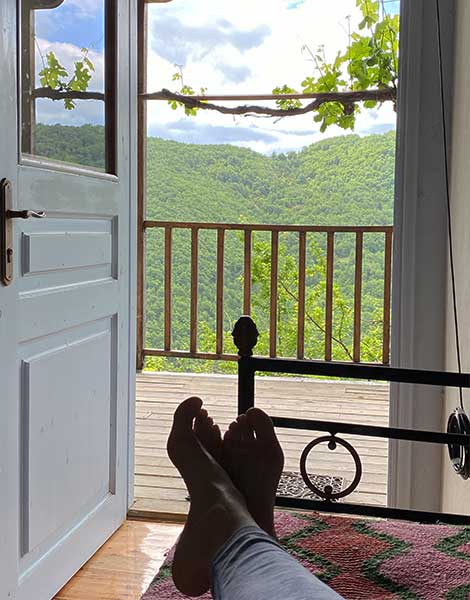
© Sofka Zinovieff
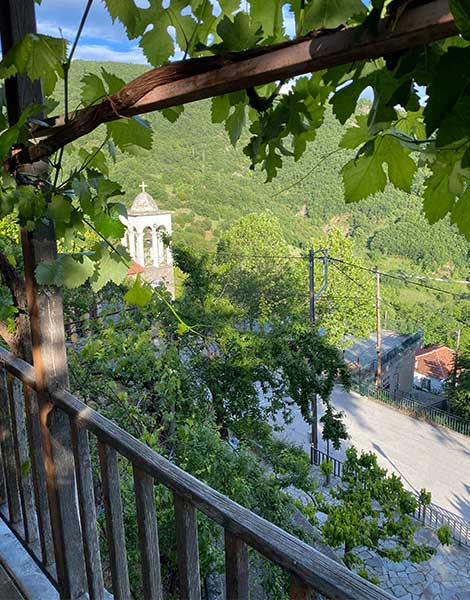
© Sofka Zinovieff
Although rumours circulated that the bishop would arrive at 9, there’s still no sign at 11. The truth is that he’s only passing through on the way somewhere else. Despite the delay, people are gathering in the square below and Argyro is preparing the kafeneio – the only remaining (and part-time) coffee shop-taverna. Aged 35 and commuting from a nearby village, she keeps the heart of the community beating with her dedication.
In the winter, her only customers are a few old men sipping an evening tsipouro, but in summer, the place flourishes with feasting and music and the influx of families returning to their old homes. During these holidays, the clock bells are switched onto a more compassionate timetable, but even so, we avoid these periods in the village. With the warm evenings, the revelries get going outside the coffee shop around the time when the bells stop at 10 pm. And they don’t stop until the chimes begin again at 6.30 am.
The acoustics in our gallery position are as good as at Epidaurus, and with each clarinet wail, cackle of laughter and car engine amplified, August nights in our bedroom sound like a crazy party. Even with shutters closed and earplugs inserted, sleep remains a vain hope.
Each time we go to the village, Vassilis spends hours beforehand phoning people with power over the bells, begging for a few days with the summer ringing schedule. He runs up against all sorts of strange, unexplained problems – the bitter, long-standing froideurs and feuds that thrive within small communities. One person is afraid, another accuses us of wanting to destroy church traditions (though the clock chimes began in in the 1980s), a third promises to help but disappears.
And then the triumph of finding someone with a church key, and switching the bell mechanism so we will have peace at night before the morning percussion begins at dawn. My friends howl with cruel laughter when I describe our suffering in this bucolic Garden of Eden.
“I’m hoping the bishop will help us with the bells,” says Vassilis, who has heard about the progressive cleric’s reputation.
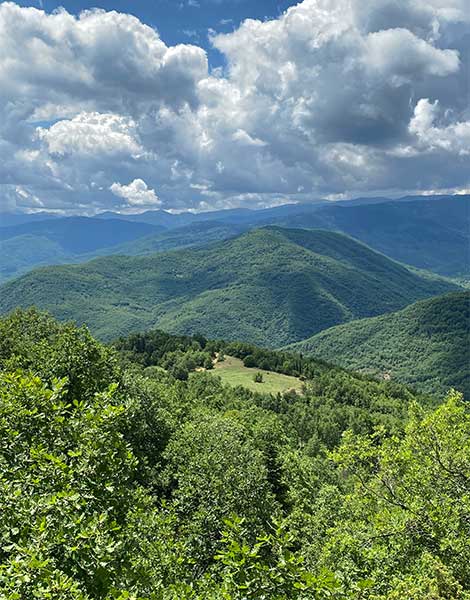
© Sofka Zinovieff
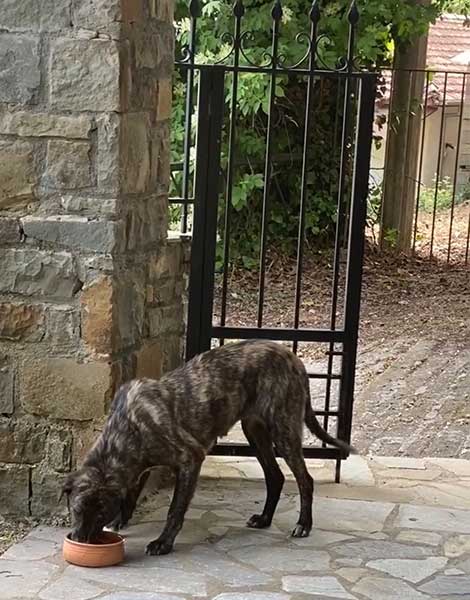
© Sofka Zinovieff
Bishop to Village Square
“We won’t have to kiss his hand, will we?” I ask, before remembering that touching in the time of Covid-19 is out of the question. Not that there seems to be much social distancing in the village compared to Athens, where anti-viral discipline has been such an astonishing success story.
Argyro pats Vassilis’ arm as she speaks – the Greek way. “Oh, I don’t believe in Corona being a problem up here,” she says when I greet her from a cautious two-meter distance. I wonder if some of the old chaps who still cultivate walnuts and chestnuts down by the river have even heard of the pandemic.
When Vassilis’ grandfather Christos and his brother Yiannis went to the US just after World War I, the village was at low economic ebb; many families couldn’t keep body and soul together and many men set off in search of paid work.
Yiannis was sad but hopeful. His sweetheart in the village on the far hill had been forbidden to marry him, her parents declaring him far too poor: “You don’t even have a house!” When he returned a wealthy man seven years later, the girl had married someone else. In reply, he built a splendid three-story house, topped with a dome and a gleaming, bronze weathervane cockerel – eminently visible across the valley as a reminder to his old sweetheart and her family of their mistake.
Great-Uncle Yiannis returned to America and only came back once, when he became Vassilis’ godfather. The community crumbled gently; more inhabitants left, preferring an easier existence in the valley or the city to the hard life, winter snows and steep slopes of the village.
An earthquake in the 1960s left the house unsafe and the top floor and dome were removed, but eventually, it was inherited by Vassilis, and over the last couple of decades, we have made it comfortable again. Now we have our own small claim to belonging in the village.
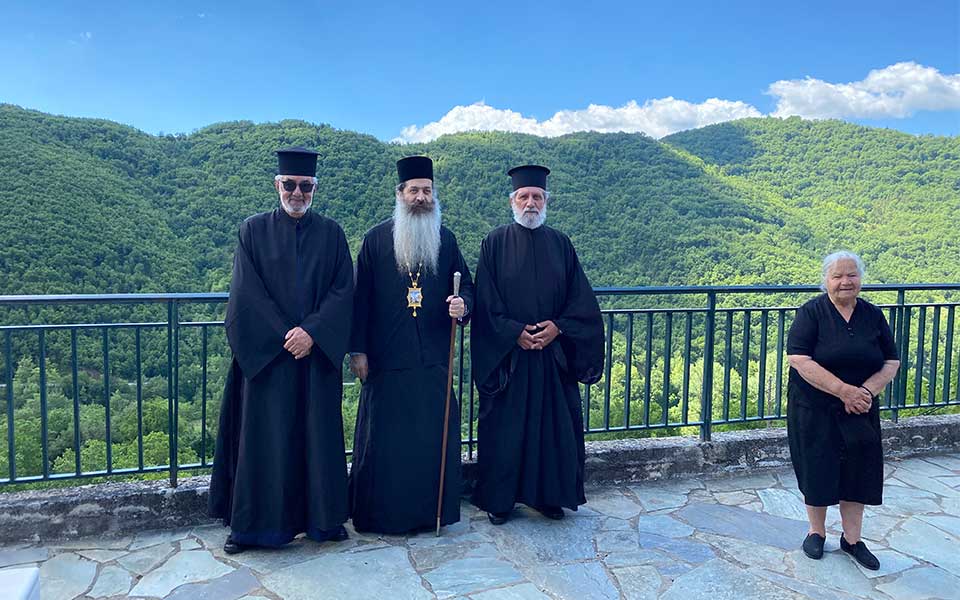
© Sofka Zinovieff
Quick! The bishop has arrived.
I hurry down the steps to the church as 12 o’ clock rings out like slaps around the head. Our visitor is relatively youthful – in his 40s perhaps, with a spark in his eye and a long, silky beard that is positively voluptuous.
Vassilis is already talking to him and introduces me. Smiling, His Eminence extends a hand. Today’s test: snub a bishop or risk Corona? I take up the challenge, eschewing the kiss but shaking hands, while picturing all the others he has touched before me.
Old kyria Evangelio is next and has no qualms, bowing her tiny frame and stopping her lips just before they make contact with his hand, as male European diplomats do. Still, she hasn’t survived almost nine decades for nothing and as we enter the church, she guides us to a large dispenser of hand-sanitizer.
There’s a bit of praying but the bishop wants chat. He’s articulate and humorous. “We want weddings here. Even elopements,” he jokes when it’s admitted that village marriages are rare (it’s funerals that are plentiful and there’s already been one this week). “I’ll come to take the first one,” he promises.
Someone brings up the subject of bells and Vassilis grasps the nettle, describing the issue. “But of course, the bells should go off at night,” the bishop agrees. “Goes without saying. And during the ‘hours of public quiet’ in the afternoon.” This is music to our suffering ears; just imagine being able to take a siesta! Someone else mentions decibels and what is permitted; these are clearly over the permitted limit. Even better!
Apparently, ear-splitting bells are breaking the law regarding noise regulation and human health right across the country. It all seems fixed. We will have peace – at least at night and maybe even in the afternoons. Photographs are taken outside the church and the bishop draws us in close, posing with his arms around kyria Evangelio – he tall, she tiny, but both beaming in black.
Before he leaves, the metropolitan hands over his visiting card, requesting that Vassilis send him the pictures – “By Viber or iMessage, or whatever.” And off they go in a big, black car, leaving about a dozen of us in the square.
“So,” says Vassilis, “You all witnessed what he said about the bells. That they must go off at night.”
“Oh, I don’t think so,” answered a church parish councilor who keeps the keys and controls these things. “I like the bells at night.” So, presumably the battle is not finished.
We wander back up to our house, where we find we are scratching at some insect bites. Further investigation reveals that we are infested with the fleas which were tormenting the adorable stray dog we’ve been feeding. We’d given her flea medication, but it now seems the bloodsuckers have transferred their loyalty to us.
The church bell rings out, some dogs start howling, a distant deer is grunting its rutting call across the valley and someone fires up a strimmer engine.
I love this place, but not for the first time, I think to myself: you don’t choose your village.
Sofka Zinovieff is the author of Eurydice Street: A Place in Athens. Her latest book is Putney. For more visit: www.sofkazinovieff.com












